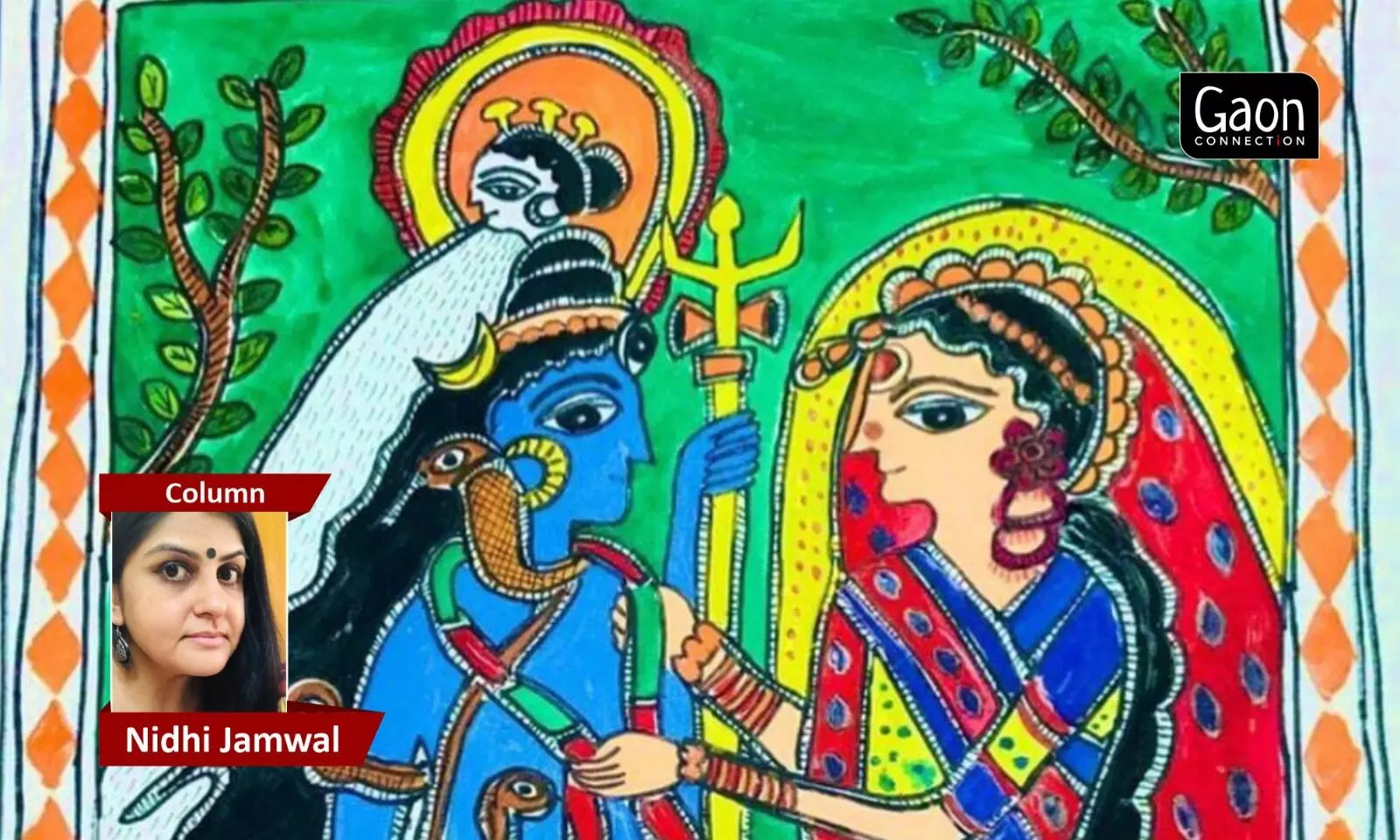Mahashivratri And The Stories My Mother Told Us
Today is MahaShivratri, the most auspicious festival of my homeland, Jammu & Kashmir. My mother, a Lord Shiva devotee, has regaled us with many stories of Bhole Nath. Her stories of Shiva taught me how our festivals are always closely linked with nature. Even our gods and goddesses were found in nature.
 Nidhi Jamwal 18 Feb 2023 11:15 AM GMT
Nidhi Jamwal 18 Feb 2023 11:15 AM GMT

MahaShivratri was also when my mother told us the story of Lord Shiva’s marriage to Parvati — how he, the dulha(groom), came dressed in a loincloth made of tiger skin with snakes of all sizes around his neck. His baraat was a procession of wildlife, big and small! Art by Nidhi Jamwal.
India is a land of stories and every story has festivities attached to it. The air is almost always thick with the sounds and smells of celebrations.
No day goes past in this melting pot of diverse cultures, rituals and traditions when a festival is not celebrated in all its uniqueness — tying thread around peepal tree, standing waist-deep in ice-cold water to welcome the rising sun, creating a goddess out of cow dung, marrying a dugwell to a bargad (banyan) tree… the list is endless.
Today is MahaShivratri, the most auspicious festival of my homeland, Jammu & Kashmir. Needless to say, my mother is a Lord Shiva devotee, and has not missed fasting on Mondays for decades. She has also regaled us with so many stories of Bhole Nath.
Also Read: Naag Panchami: Jammu's Dogra community is a fervent worshipper of the serpent god
Every MahaShivratri, as she went about her daily chores, she would begin… “During the winter months, the snakes, the centipedes, the scorpions, etc., take refuge in Shivji’s large jhola (sack) and he takes care of them through the harsh weather. Then, on MahaShivratri, Shivji opens his sack and lets out all of them. So, now onwards you need to be careful when you climb up the hills or play near the bushes. Shivji has announced the arrival of the summer.”
Back then, we lived in a small hill township in J&K and it wasn’t unusual to spot a snake; watching centipedes and millipedes crawl was our favourite pastime; and we did not bat an eyelid when confronted with creepy crawlies with whom we share this planet.
They went about doing their business of staying out of the way of pesky children while we went about looking for the perfect stone in the khadd (ravine) to play stapoo (hopscotch) with. We kissed the stone before we tossed it into the hopscotch squares drawn on the ground for luck. I am not sure if it helped us win the game, but it certainly built up our immunity.
Also Read: Festive season, craft fairs help Odisha's Kendara singers to find their lost ground
MahaShivratri was also when my mother told us the story of Lord Shiva’s marriage to Parvati — how he, the dulha(groom), came dressed in a loincloth made of tiger skin with snakes of all sizes around his neck. His baraat was a procession of wildlife, big and small!
Parvati’s family members were aghast at the bridegroom’s party and swooned with horror. This was our favourite bit of the story and we always laughed out loud at this part. I now see how our festivals are always closely linked with Nature. Even our gods and goddesses were found in nature.
Our hill township had a large number of Kashmiri Pandit families for whom MahaShivratri (Kashmiri Herath) remains the most important festival of the year. Our Kashmiri friends would give us loads of soaked walnuts (MahaShivratri prasad), which we broke opened with our teeth and gorged on. I can still taste the sweetness of those soaked walnuts in my mouth.
We saved and savoured those soaked walnuts for a couple of days, and carried them to school too. We enjoyed living dangerously and often broke open those walnuts in the middle of a trigonometry class. ‘What is this life if, full of care, we can’t eat walnuts and risk the dare’, we told ourselves. The walnuts were never confiscated.
Also Read: Celebrate Diwali with homemade sweets and savoury snacks recipes
Though it was a day of fasting, the MahaShivratri fast was more like a feast. My mother cooked at least eight to ten different kinds of vrat ka khana — desi ghee main bane alu, dahi wale alu, kaddu ki subzi, kuttu ki roti, kuttu ki puri, vrat wali kheer, fruit salad and more.
Today it is Shivratri and I live 1,400 kilometres away from home. But, early this morning, my mother sent images of her MahaShivratri puja — a Shivling with belpatra and flowers, ber (Indian jujube) the size of apples, diya-dhoop-agarbatti.
Eleven years ago, when my son was born, I named him Vahin, another name for my favourite god Shiva.
#Jammu&Kashmir #Maha Shivratri
More Stories




